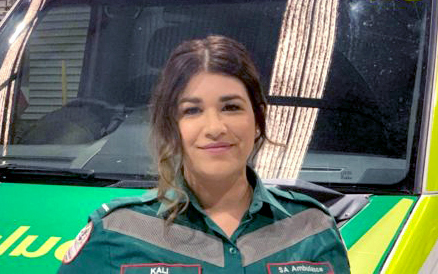
A long term desire to become a paramedic pushed Kali Graham (BParamedicSc ’18) to step outside her comfort zone to explore Flinders University’s Foundation Studies program. Six years later she graduated with a Bachelor of Paramedic Science, which she says was the “highlight of my life”.
An Aboriginal woman of Narungga descent, in 2018 Kali became the first person in her family to graduate from university.
“Walking onto that stage at graduation was the highlight of my life,” says Kali. “My time at Flinders showed me that I am capable of doing what I set my mind to.”
After completing her degree, Kali undertook a paramedic internship with the SA Ambulance Service in Adelaide, and in July 2019 she began working as a fully qualified paramedic in Whyalla.
Vast distances and limited access to resources are among the challenges to working in a remote location such as Whyalla, which Kali says, “forces us to think outside the box to come up with a solution to a problem, which is a great way to develop your lateral thinking.”
Kali’s Indigenous heritage is one of the reasons that drew her to Whyalla, with its diverse range of Indigenous groups that live in and visit the predominantly Barngarla country.
“I feel that being an Indigenous health worker has mostly had a positive effect on building rapport and trust with my Indigenous patients. Having the ability to connect with the Indigenous community in such a capacity has been invaluable to me,” says Kali.
With an Indigenous colleague, Kali ran mentoring-style workshops as part of Solid Starts, a program designed for Aboriginal high school students to network and learn about the range of careers available in health.
“This opportunity really gave me a unique insight into rural life for these young people and the challenges they face daily and has helped me in my current role.”
Kali’s first experience of mentoring was through Flinders University’s Inspire Mentorship program, where she was paired with four young Port Augusta-based Indigenous students from disadvantaged backgrounds.
She says the experience “helped shaped both my personal and professional mindset about Indigenous health. It kick-started my passion for mentoring young people and encouraging more Aboriginal kids to consider careers in health.”
Reflecting on her student days, Kali says she found university difficult initially, but persevered until things got easier and she began excelling in her studies. She learned how to receive constructive feedback and to understand her limitations, and credits the lecturers with giving her the encouragement she needed to build her confidence.
“When I first started university I was pretty shy but my studies pushed me to communicate with all sorts of people through consistent exposure to situations that completely threw me out of my comfort zone.
“Paramedicine is 90% communication, with patients, their families, colleagues, superiors and other emergency services, and I now have no problem walking up to anybody and starting a conversation.”
Learn more about studying Paramedic Science at Flinders University.

